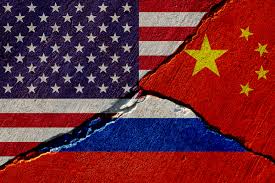The world is currently in a precarious transition, characterized by an escalating rivalry between the United States and China that is fundamentally altering the geopolitical landscape, according to experts. Although neither superpower seeks direct conflict, a pervasive mistrust is fostering a competitive atmosphere that threatens to further disintegrate an already fragile global order.
The competition for global dominance between Washington and Beijing has shifted from a looming threat to a central aspect of the 21st century. Both countries assert that they do not intend to force other nations into taking sides, a position reflected in diplomatic statements from both capitals. Nonetheless, beneath the surface, both the US and China are working rigorously to strengthen their spheres of influence, drawing nations into their orbit through economic incentives, strategic alliances, and military posturing.
“We are witnessing a chaotic global transition, and honestly, the outcome is unpredictable,” remarked Dr. Eleanor Vance, a geopolitical expert at the Institute for Strategic Studies. “The established post-World War II order is deteriorating, but there is no discernible successor ready to step in.”
A significant aspect of this transition is the changing role of the United States on the global stage. After decades of serving as the “guarantor of order” and often viewed as the “world’s policeman,” the US is now noticeably retreating from that role. This withdrawal, driven by domestic political challenges and a reevaluation of foreign policy goals, has resulted in a power vacuum. Importantly, neither China nor any other major international player is currently positioned or inclined to fully occupy that space.
“The US retreat isn’t merely about relinquishing leadership,” clarifies Professor Jian Li, a China expert at Georgetown University. “It represents a fundamental shift in strategy. America is now prioritizing its own interests, which creates a significant gap in global governance.”
The implications are already being felt. Faced with rising uncertainty, nations are increasingly focusing on their own immediate interests, moving away from the spirit of global cooperation that defined the post-Cold War era. This has led to a more fragmented and chaotic world, marked by growing competition and deepening mistrust.
One of the most critical flashpoints is Taiwan. Misunderstandings regarding the island’s status or any hostile action from either side could provoke a broader, potentially catastrophic escalation—a threat frequently emphasized by security analysts.
This developing rivalry is not just a bilateral concern; it affects trade, technology, security alliances, and the structure of international governance. As the US and China continue to compete for influence, the world prepares for a period of lasting instability, facing the challenges of a new, complex, and potentially dangerous power balance.
